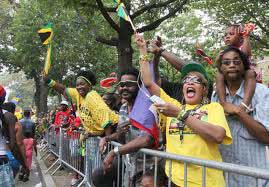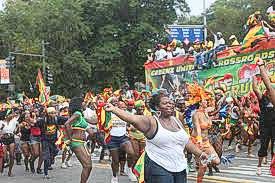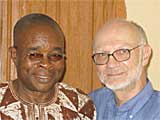A Writer Writes: Happy Birthday, Nigeria
Happy Birthday, Nigeria
by Bob Criso (Nigeria 1966–67; Somalia 1967–68)
THE FLOATS ROLL DOWN SECOND AVENUE from 54th to 44th Street on a dazzling fall Saturday afternoon in New York City. Women draped in a kaleidoscope of African prints and men in ceremonial robes fit for kings are dancing and waving the green and white stripes of the Nigerian flag, their smiles as wide as the Atlantic. The infectious rhythms of West African hip-hop blast from gigantic speakers on the back of the trucks igniting the crowd on the sidewalks to dance along. A flock of supporters surround each float like buzzing bees, dancing, spinning, unable to contain their enthusiasm. Miss Nigeria, resplendent in a regal white gown and sparkling tiara, passes in a chauffeured shiny red convertible, surrounded by a court of attendants in flowing white dresses, like bridesmaids in a royal wedding.
 On the sidewalks the crowds are four and five deep, dancing, waving flags and cheering their favorite floats, groups and music as they pass. Imo State gets a cheer, then the Nigerian Christian Church of God, Nigerian Students of City University and the Organization for the Advancement of Nigerians. Curbside promoters hand out flyers and cards advertising their wares: Ibadan Descendants of New York Inc, Mirage African Restaurant, Africa.com/deals.
On the sidewalks the crowds are four and five deep, dancing, waving flags and cheering their favorite floats, groups and music as they pass. Imo State gets a cheer, then the Nigerian Christian Church of God, Nigerian Students of City University and the Organization for the Advancement of Nigerians. Curbside promoters hand out flyers and cards advertising their wares: Ibadan Descendants of New York Inc, Mirage African Restaurant, Africa.com/deals.
It’s Nigeria’s fiftieth birthday and I’m standing on 49th Street watching the Nigerian Independence Day Parade and Festival, 2011. It’s also the forty-fifth anniversary of my arrival in Ishiagu as a Peace Corps Volunteer. As I absorb the spectacle and the mood, I feel a rush of emotion that I didn’t know was still there. I’m transported back forty-five years and six thousand miles and see myself teaching English in a stifling classroom, drinking palm wine in a mud hut, dancing at a highlife bar in Enugu. Why do so many of the faces seem familiar? Doesn’t that man look just like Ekuma, one of my fellow teachers? That woman over there reminds me of Eze who made the clay pots in Ishiagu. And I could swear that’s Samuel, the guy who drove the taxis to Afikpo.
 My eyes connect with a short, thin young man on the City University float. We both smile. Just like Felix, I think, one the youngest students at my school. He bends down as the float passes, scoops up something from behind him and throws it at me. Startled and surprised, I catch a green Nigerian Day Parade tee shirt with a tan geometric African design on the back. I’m thrilled and I give him a quick thumbs-up while I rock my shoulders and arms to the music. He points both his hands at me, forefingers straight out like a cowboy holding six-shooters, leans back and fires a smile at me that I’ll never forget. I thought I had put it all behind me, especially after my return visit in 2008, so why are my eyes welling up? Here it is again, Nigeria, refusing to be forgotten, still haunting me like it was yesterday.
My eyes connect with a short, thin young man on the City University float. We both smile. Just like Felix, I think, one the youngest students at my school. He bends down as the float passes, scoops up something from behind him and throws it at me. Startled and surprised, I catch a green Nigerian Day Parade tee shirt with a tan geometric African design on the back. I’m thrilled and I give him a quick thumbs-up while I rock my shoulders and arms to the music. He points both his hands at me, forefingers straight out like a cowboy holding six-shooters, leans back and fires a smile at me that I’ll never forget. I thought I had put it all behind me, especially after my return visit in 2008, so why are my eyes welling up? Here it is again, Nigeria, refusing to be forgotten, still haunting me like it was yesterday.
A festival follows on 46th Steet between First and Second Avenues at Dag Hammarskjold Plaza, near the UN. More vendors, more music, some long-winded speeches and, of course, the food: okra stew, pounded yams, jolof rice, fufu, pepper soup, stockfish, goat meat. I recall the time I ate the goat intestines at a local wedding in Ishiagu and liked it. I approach one of the female cooks who looks like an Igbo. “Kedu,” I say and she responds automatically before seeing me, stirring her pepper soup, “A dim ma.” Her eyes almost pop out when she looks up. I ask her if she has any achicha and garri. She doubles over in laughter and delight and calls her friend over. “Esther, come here and meet this man.” She speaks to me in that musical Igbo-accented English, warmly as if she were talking to an extended family member. “You have been living in Nigeria,” she says, “tell me, what place were you staying?”
Like so many prior experiences I’ve had, Nigerians are thrilled when you know their language, their town, their father’s town, their food or their history:
“You were there during the war! I can’t believe it,” a man selling Nigerian CD’s says. “Tell me about the war,” he asks, “my parents won’t talk about it.”
“Hah” another man exclaims. He has that high-pitched exclamation of surprise that many Easterners use when they can’t believe what they are hearing. “You have been to Yenagoa! It is so hard to go there, especially in those days.” Of course, Peace Corps Volunteers went to many remote areas. My friend Dave and I went to visit Josh, another Volunteer, during one of our school vacations.
Later that night, I begin to digest what happened. I went to the parade on the spur of the moment when I saw it listed in the morning paper. So why was so much feeling stirred up? Nostalgia? Was it Nigeria that I was missing or my youth? I was twenty-two when I was there, full of energy, hope, curiosity and adventure. I was also pretty innocent and naïve. I shudder when I think about some of the risks I took: the poisonous snakes around my house, some of the dicey food and water choices I made while traveling, the confrontations at the roadblocks after the war started. But we were immortal then, weren’t we?
I thought about all the optimism in Nigeria and the world after independence; Nigeria, the largest and most promising democracy in Africa. I thought about the vision of the early leaders, Azikwe, Balewa, Awolowo, Nigeria’s Washington, Jefferson and Hamilton. What happened to the dream? A flyer I picked up from the Organization for the Advancement of Nigeria says their goal is “to embrace innovative strategies aimed as fostering unity and cooperation among Nigerians.” “Diversity is our strength,” it emphasizes in dark print — something that is often said about America as well. Diversity as strength? Diversity was the problem when I was there. It led to tribal massacres, Biafra, the kwashiorkor babies, millions dying during an endless war because of oil, money and political power grabs that were rooted in tribal and religious conflict. I couldn’t face the stories in the New York Times when I got back to the States: Enugu falls, thousands of casualties, Owerri is overrun, Red Cross planes fly food and medical supplies into Biafra under cover of night, pictures of those babies on the front pages. All of it while the world watched and waited, like Bosnia. It wasn’t just another war in Africa; those were my students who were dying while fighting for their lives. “It was kill or be killed,” as one of the students who survived the war told me in 2008.
I thought about my trip back in 2008: the railway no longer running because of neglect, poverty as bad as or worse than ever despite billions in oil revenues, crime out of control, travel treacherous, Christians and Muslims killing each other in Jos. Have I just matured to the harshness of life or have things gotten worse? “Things fall apart,” the words Chinua Achebe borrowed from Yeats half a century ago for his brilliant novel, seemed prophetic.
And what about the parallels to the US today: all that money bunched at the top, poverty and hunger rising, foreclosures climbing, a culture fragmented and divided against itself, corruption and special interests controlling elections, looking for a leader to take the helm and lead us out of the darkness. So much of the world seems adrift and rudderless, not just Nigeria.
Then I think about my experience at the parade again earlier in the day. I often find hope when I encounter Nigerians. I admire their spirit, their perseverance, their capacity to enjoy despite it all. After forty-five years, I continue to mine the gold from my Peace Corps experience.
•
 Bob Criso served in Ishaiagu, Nigeria from April 1966 through the end of July 1967 as a teacher, and was literally rescued from his village by troops after the Biafran war started. He then spent nine months in Somalia as a PCV after leaving Nigeria.
Bob Criso served in Ishaiagu, Nigeria from April 1966 through the end of July 1967 as a teacher, and was literally rescued from his village by troops after the Biafran war started. He then spent nine months in Somalia as a PCV after leaving Nigeria.
His career has been as a psychotherapist in private practice and at Princeton University. Two and half years ago he moved to New York and is now writing movie and theater reviews full time.
In the photo above, at the right is Bob, on the left is Fabian Nwachukwu, one of Bob’s former students who survived the war, who Bob found in 2008 when he returned to Nigeria.
Thanks, Bob, for taking us there.